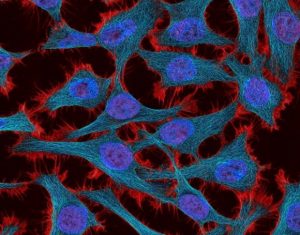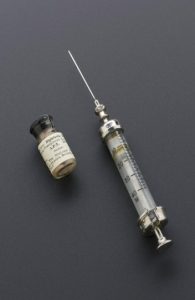Today marks the start of Cervical Cancer Prevention Week: 23rd–29th January 2023.
To celebrate, we are sharing a speech made by the leader of our group, Professor of Cancer Prevention, Peter Sasieni, for London Global Cancer Week in the House of Lords in November last year.
The Fight for Global Health Equity: Eliminating Cervical Cancer
Tuesday 29th November 2022
House of Lords, Houses of Parliament, London, SW1A 0PW
Professor Peter Sasieni
Baroness Scotland, Lord Bishop of Carlisle, Your Excellency, Ladies and Gentleman…
The Power of Science
Cervical cancer is the only common cancer that is largely preventable. In the UK we are on target to making it a very rare disease. That is only possible because of scientific discoveries, many of which have involved British researchers and relied on Cancer Research UK funding. Scientific research generates knowledge and develops applications of that knowledge for the public good.
In 1950, about 1 in 100 deaths in women in the UK were from cervical cancer. Today, thanks to a world-leading screening programme, that figure is 1 in 400. What is more, HPV vaccination is preventing most cervical cancers in young women.
When I started my career, we did not know what caused cervical cancer; and screening was yet to have a substantial impact.
I recall lecturing on the epidemiology of cervical cancer at the Royal College of Obstetricians and Gynaecologists in the early ‘90s. Most of the audience did not think that HPV caused the disease. And one of my first research papers showed how only after the reorganisation of screening in 1989 did cervical cancer rates in this country begin to fall.
Much has changed since then.

Key Milestones
- Most strikingly, Nobel Prize winning research in the 1980’s discovered that cervical cancer is caused by human papilloma viruses.
- This discovery led to the development of HPV tests that we, and others, showed could dramatically improve screening. Such testing is now standard.
- HPV testing can even be done on self-collected samples which makes screening accessible to women who might otherwise have been excluded.
- New approaches to treatment of precancerous lesions have been developed using hand-held battery-powered devices that can be safely operated by a nurse or midwife.
- The HPV vaccine was developed and evaluated in clinical trials. The vaccine was shown to prevent infection with HPV if given to girls and young women before exposure to the virus. It was introduced in England in 2008.

- Most recently we have shown a dramatic reduction in cervical cancer in cohorts of young women offered HPV vaccination whilst at school. Remarkably, the vaccine was shown to be preventing 87% of cervical cancers in women born since 1996. Those results were even better than I had hoped for. I had spent 30 years talking about preventing cervical cancer. That dream is now a reality. I feel incredibly lucky to have been part of the international scientific community researching human papillomaviruses.

- Meanwhile trials have shown that just one dose of HPV vaccine is extremely effective. Originally, immunisation required three doses of the vaccine. The UK and others are now switching to a single dose. Much of the evidence for that decision comes from a trial in India, that I have had the honour of reviewing annually over the last decade. The trial was planned to compare two doses to three. But, for bizarre reasons, many of the girls were only offered one dose. To everyone’s surprise, those girls did just as well as those who received three doses.
Looking Ahead
Through screening and vaccination, we are today preventing most cervical cancers in the UK. The WHO has an ambitious target to eliminate cancer of the cervix as a major public health problem globally. Science has made our world a better place. Governments must ensure the whole world benefits.
His Majesty’s Government aims to become a scientific superpower by 2030. To achieve this, it is not enough to focus on the UK. Science is not a zero-sum game. Paraphrasing the late Rabbi Lord Sacks:
“With power and wealth, the more we share the less we have. But with social goods, the more we share the more we have.”
Science is not primarily about competition. It is about cooperation.
On Global Collaboration for Achieving Prevention Equity Globally
To be a scientific superpower, we must share our knowledge and expertise. We must ensure that there is equitable access to our discoveries; we must focus our minds to find scalable solutions to the major health problems facing low- and middle-income countries across the world.
Translating scientific breakthroughs to eliminate cervical cancer globally requires further research and engineering advances. But it also needs governments, corporations, and Civil Society to work together to fund, manage, and deliver those innovations.

My ancestors came to this country as economic migrants and refugees. I am proud that a former student of mine, Maribel Almonte Pacheco, from Peru, is leading cervical cancer screening and implementation research at the WHO. Next week I’ll be in India to discuss their practice-changing trial of HPV vaccination, and then to participate in an Asian-Pacific conference on cancer prevention.
Cancer Research UK, thank you for giving me the opportunity to conduct research that has contributed to enabling us to be discussing the global elimination of cervical cancer today. I’m not an economist, but I think your investment in scientific research has been well spent. But to ensure that it truly delivers, you, together with the British government, also need to invest in ensuring that those breakthroughs can be adapted and delivered throughout the Commonwealth and throughout the world.
By collaborating internationally, the UK will attract the best talent. If we want to be a scientific superpower, if we want to have global influence, we must tackle global health problems. Global scientific research is a social good – the more we share the more we have.
Further Reading
HPV vaccination in south Asia: new progress, old challenges – The Lancet Oncology
India develops its first cervical cancer vaccine | Reuters
China Approves Production of First Domestic HPV Vaccine (sixthtone.com)
Thermal ablation offers new hope for cervical cancer prevention | PATH
YouScreen | North East London Health & Care Partnership (northeastlondonhcp.nhs.uk)
Cancer Research UK – Science blog
Behind the headlines: HPV self-sampling | Jo’s Cervical Cancer Trust (jostrust.org.uk)
Cancer Prevention Group Blog – The History of HPV and Cervical Cancer

